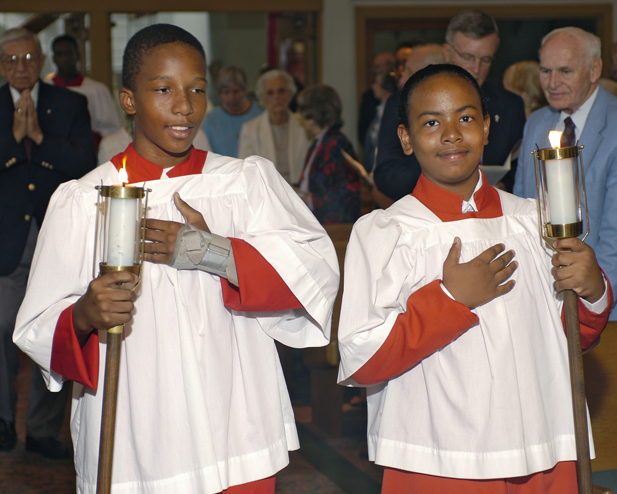Corpus Christi Parish - Stone Mountain, Georgia
 |
|
Corpus Christi Parish includes all people |
The Claretian Parish of Corpus Christi in Stone Mountain, Georgia, is a community that welcomes diversity with a sincere desire to include all people into one Church, while keeping the distinctiveness of their heritages alive.
“We are home to many immigrants from Mexico, Nigeria, the English-speaking Caribbean islands, Kenya and the Philippines,” says Fr. Len Brown, C.M.F., who became pastor of Corpus Christi Parish in October 2008. “There’s quite a mix here, truly the Body of Christ!”
Located in a suburb of Atlanta, Georgia, Corpus Christi serves the spiritual and social needs of 1,600 families. Stone Mountain has a rich blend of ethnic and cultural diversity that is derived from its large population of Hispanics, Native Americans, Asians, Caribbeans, Africans, African Americans, and Europeans.
“We have people from everywhere,” says Fr. Len. “I was reading an article in the New York Times that listed the ten worst dictators in the world, and I noticed that we had five of those cultures represented in our parish.”
Aid agencies in the Stone Mountain area help these refugees find housing and jobs when they come to America. The first stop for many refugees seeking a place of worship is Corpus Christi Parish. “One of the challenges is trying to fulfill the needs of the refugees,” explains Fr. Len. “The sponsoring agency is only responsible for them for the first two to three months. After that they’re on their own. And that’s a really frightening thing when you think about it.
“We have refugees from Myanmar, Burundi, Eritrea, and Sudan, to name a few,” he says. “And on top of that we have huge groups of immigrants as well.”
After being invited to celebrate Mass for the Eritrean Catholic community at Corpus Christi, Most Rev. Wilton D. Gregory, Archbishop of Atlanta, walked away in awe. “As I arrived, one of the Hispanic Masses was just concluding, and as a consequence, people were mingling in the vestibule as these two cultures exchanged seats in the church,” explains Archbishop Gregory. “The church welcomed both groups, and both communities were aware of comfortably belonging to a common church home.”
Since their arrival, the Claretians have assisted the large number of immigrants and refugees who struggle to establish themselves in their new country and are a major force in helping newcomers to the community feel at home.
“When I first came to Corpus Christi, we were a very white parish. Now we are a multi-cultural community of people from all over the world, and it feels very Catholic,” says longtime parish employee Gini Eagen, who has been working at Corpus Christi for the past 23 years. “It’s wonderful. It’s not just a church down the street, but truly a world church.”
“Fr. Len was a bit thunderstruck when he first arrived,” explains Gini. “It’s been an education for him.
“My work is a constant learning experience too. [Retired Pastor] Fr. Kenny had to buy me a globe because I had to know where these people were coming from,” says Gini, who traveled to Sudan and El Salvador to visit some of the communities where the refugees at Corpus Christi come from.
“You can’t measure the progress of the refugee communities by leaps and bounds, but rather small measurements,” adds Fr. Len. “Many have adapted, many have learned English, gone to college, found jobs, and moved away. For the most part, as they move up the ladder, they find jobs and they move on.”
Corpus Christi is an active and diverse parish. Among its ministries and activities are a day care program, youth and young adult ministries, health ministry, athletics programs, a youth basketball league, a thrift shop, food programs, and active outreach to both Arabic and French speaking immigrants and refugees from Africa, and Spanish-speaking immigrants from Mexico and Latin America.
“We are blessed to have the Claretian priests here,” explains Gini. “They are men who are experienced in dealing with people from other cultures and living in other lands.”
“Many of them have experienced what others have left behind,” says Gini. “That has been a tremendous benefit to our congregation.”
“As long as I have been here, we in the Sudanese community have been depending on the Claretians,” says Stephen Bayok, who came to Corpus Christi from war-ravaged Sudan. “I cannot even mention all they have done for us. It is too much.”